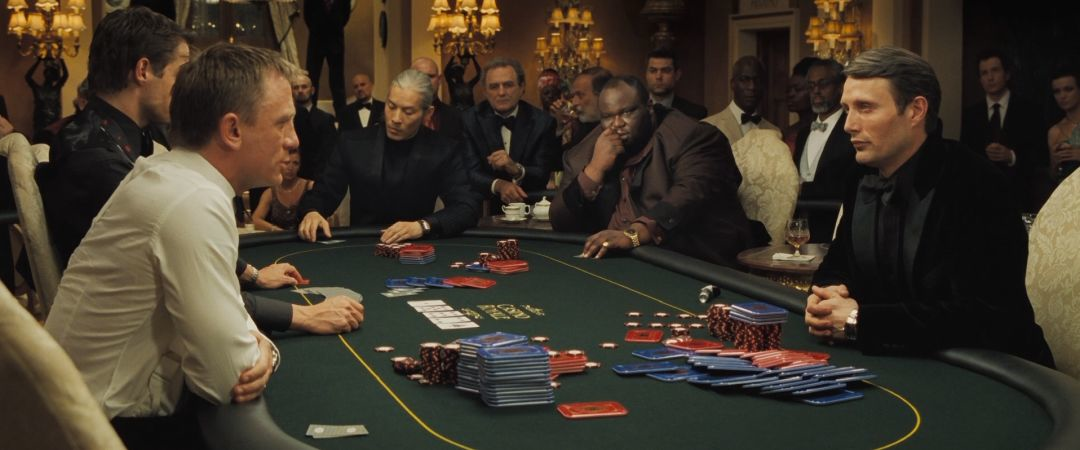- A+
我从德州扑克中学到了这 4 点
过去一年德州扑克成了我的业余爱好。从只是知道游戏规则到真正领悟到它的魅力,这个过程我学到很多扑克以外的东西。虽然我还是一个入门级玩家,但在这里想跟大家分享下。新的一年,祝愿大家不仅在工作上有所成就,还能保持一两门爱好。2019 年也许不会变得更好,但我们还是要有获取幸福的能力啊。

Paypal Mafia playing poker
Texas hold'em, the most popular variant of poker, is synonymous with poker itself. The game is so popular that according to a 2014 article, about 350 million people (the equivalent of the entire US population) have played on Zynga Poker, the largest poker site in the world. Plus, it boasts millions of daily players, the envy of most apps.
While most are dabblers, some play professionally and have perfected the art of pokering and pokered their way to the pinnacle of money and fame. Johnny Chan, Daniel Negreanu, Phil Ivey, Erik Seidel, Phil Hellmuth, and Doyle Brunson, for example, are but a few best-known all-time poker maestros who have shaped and popularized the game.
Once I got the hang of the game, I started to play deliberately. As I played I also watched video clips of classic showdowns between the best of the best, trying to work out the puzzles I had gathered while playing.
Below are the four lessons I learned from poker in 2018.
1. Playing poker is like writing. You keep making decisions.
If we break writing down, it's all about decision making--how to write the first sentence (or hook); what about the last sentence of the eighth paragraph; more or less detail; active or passive; adjective or verb. This can run like a laundry list. By the time you finish a 1,000-word essay, you probably will have made as many as a few hundred decisions, reflexively or deliberately.
Poker playing, too, concerns decision making. Deciding when to fold (discard the cards and give up), call (play alone by betting the amount equalling the biggest better) and raise (betting more than the biggest better) is all that a player does.
The difference? In poker, the decisions you make have immediate and sometimes serious consequences (depending on how much you bet). You either eat or be eaten. The brutal rivalry enables you to constantly gauge and calibrate your decisions.
2. Don't confuse "well played" with "nice hand".
If you play no more than a few hands, poker is a gamble. It's not worth the time and effort to know the ins and outs of the game. If you play regularly, however, then it's a skill game. Your experience and internalized strategy count.
Novices easily mistake "well played" for "nice hand". On poker apps, quick reply buttons such as "nice hand" and "got lucky" can misguide even experienced players to think that a well-played hand won out by pure luck. It is not.
Luck may play a part, but to win often and much, in the long run, is clearly a testament to a player's skill and strategy, or the quality of a series of decisions, decisions made under pressure. Being able to correctly identify and separate luck and skill is itself an essential skill for survival in the cut-throat world of poker.
This lesson is broadly applicable in life. The successful may credit their success to luck rather than skill and hard work, but the reality that only a few pull it off suggests that there is another determinant jigsaw in the puzzle: skill. Once we recognize this, we can move on with the right question--how can we improve the skill?

sink or swim
3. It's always easier when you know others' hands.
The sad truth is you don't. (Or is it really sad?) The essence of this statement is uncertainty. The hand that justifies a big bet on the first three cards (known as community cards) may no longer merit a bet on the fourth (turn) or fifth (river) card. Similarly, your opponent's two pairs could turn into a monster full house (three of a kind plus a pair) on the turn, and his flush on the river can be disturbingly crippling.
We are wired to welcome order and certainty and shun chaos and uncertainty. Yet simply because we are so inclined is no reason to think that that is how the world works.
I take pleasure in playing poker because it is a game that brilliantly mimics the real world. Probability, randomness, greed, restraint, skill, resilience, curiosity, and fear all come into play. It is a game where you have to recognize and, better still, learn to be comfortable with uncertainty and change.
The good news is that uncertainty is by definition probabilistic and thus quantifiable. This is why I personally take poker fundamentally as a skill or strategy game, not a gamble.
4. Good decisions don't always bring about good results.
Precisely because poker is full of uncertainties, good decisions are often not absolute, but relative. Understandably, we are predisposed to believe that good intentions and smart decisions should yield good results. They may or may not, however.
Sticking to such a predisposition runs the risk of confounding causation with correlation, only selecting "friendly" data to confirm the scenario we favor (known in psychological jargon as "confirmation bias"), or subjecting to hindsight bias (one symptom being "I totally should have known this"). Cognitive pitfalls like these can have deadly consequences over the long term.
Just as we are better off by embracing uncertainty, we are better off by accepting failure, gracefully. And only when we do this can we be back on the track of strategy recalibration.
As the famous saying goes, "It takes a moment to learn Texas hold'em, but a lifetime to master it." The same can be said of life as well, as aptly put in a line in Han Han-directed movie The Continent, "Lessons as I have learned, I still can't live a happy life as the lessons said." Now it makes all the sense to be a lifelong liver, learner, and maybe poker player too. 
P.S. I wish you a Happy New Year and every success in life and work in 2019.
P.P.S. 如果你也玩德扑,欢迎分享你从中收获的心得。www.moshike.com



